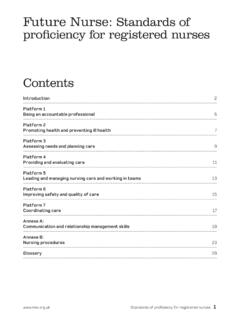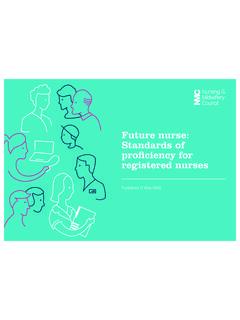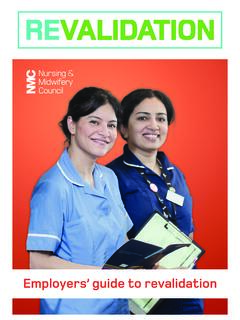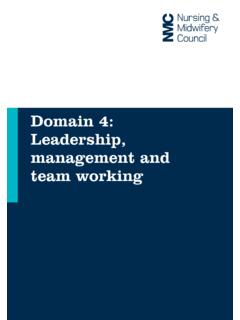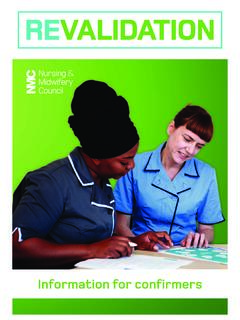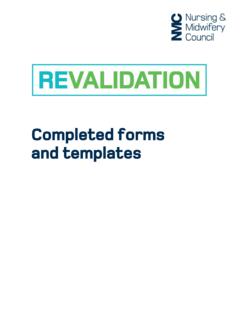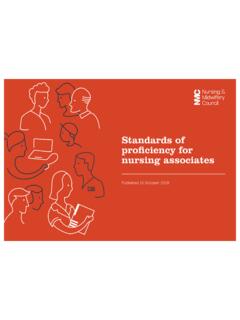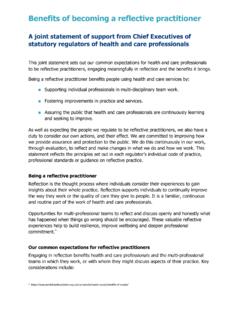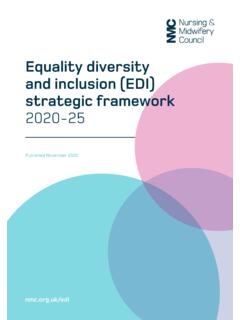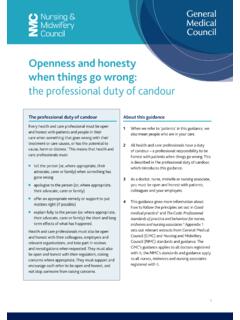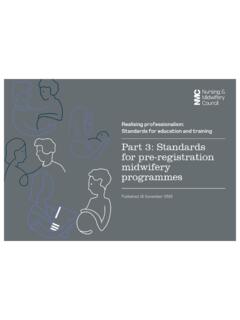Transcription of Part 3: Standards for pre-registration nursing programmes
1 programme Standards : Standards for pre-registration nursing programmes 1 Realising professionalism: Standards for education and trainingPart 3: Standards for pre-registration nursing programmesPublished 17 May programme Standards : Standards for pre-registration nursing programmes 2 About these standardsRealising professionalism: Standards for education and training includes the Standards framework for nursing1 and midwifery education, Standards for student supervision and assessment, and programme Standards specific to each approved Standards for education and training are set out in three parts:Part 1: Standards framework for nursing and midwifery educationPart 2: Standards for student supervision and assessmentPart 3: programme Standards Standards for pre-registration nursing education Standards for pre-registration nursing associate education Standards for prescribing programmesThese Standards help nursing and midwifery students achieve the NMC proficiencies and programme outcomes.
2 All nursing and midwifery professionals must practise in line with the requirements of The Code, the professional Standards of practice and behaviour that nurses, midwives and nursing associates are expected to uphold. 1 We have used the phrase nursing in this document to apply to the work of nurses and nursing associates. nursing associates are a distinct profession with their own part of our register, but they are part of the nursing programme Standards : Standards for pre-registration nursing programmes 3 IntroductionOur Standards for pre-registration nursing programmes set out the legal requirements, entry requirements, availability of recognition of prior learning, length of programme , methods of assessment and information on the award for all pre-registration nursing education nurses must successfully complete an NMC approved pre-registration programme in order to meet the Standards of proficiency for registered nurses and to be eligible to apply, and be entered onto, the NMC register.
3 Public safety is central to our Standards . Students will be in contact with people throughout their education and it s important that they learn in a safe and effective programme Standards should be read with the NMC Standards framework for nursing and midwifery education and Standards for student supervision and assessment which apply to all NMC approved programmes . There must be compliance with all these Standards for an education institution to be approved and to run any NMC approved education and trainingStandards of profi ciencyfor nursingand midwifery professionsPrePostStandards framework for nursing and midwifery educationStandards for student supervision and programme Standards : Standards for pre-registration nursing programmes 4 Education providers structure their educational programmes to comply with our programme Standards .
4 They also design their curricula around the published proficiencies for a particular programme and students are assessed against these proficiencies to make sure they are capable of providing safe and effective care. Proficiencies are the knowledge, skills and behaviours that nurses and midwives need in order to practise. We publish Standards of proficiency for the nursing and midwifery professions as well as proficiencies for NMC approved post- registration programmes . Through our quality assurance (QA) processes we check that education programmes meet all of our Standards regarding the structure and delivery of educational programmes , that the programme outcomes relate to the expected proficiencies for particular qualifications and that the approved education institutions (AEIs) and practice learning partners are managing risks effectively.
5 Using internal and external intelligence we monitor risks to quality in education and training; this intelligence gathering includes analysis of system regulator reports. Before any programme can be run, we make sure it meets our Standards . We do this through an approvals process, in accordance with our Quality assurance framework. Legislative frameworkArticle 15(1) of the nursing and Midwifery Order 2001 ( the Order ) requires the Council to establish Standards for education and training which are necessary to achieve the Standards of proficiency for admission to the register, as required by Article 5(2) of the Order. The Standards for pre-registration nursing programmes are established under the provision of Article 15(1) of the Order.
6 Overall responsibility for the day-to-day management of the quality of any educational programme lies with an AEI in partnership with practice learning programme Standards : Standards for pre-registration nursing programmes 5 Four fields of nursing practiceIn accordance with the Nurses & Midwives (Part and Entries in the Register) Order of Council 2004 (SI 2004/1765), which states that entries in the register are to include a registrant s field of practice, UK students that qualify in a specific field of practice as a level 1 nurse may apply to enter the NMC register as a nurse in one or more of the four fields of nursing practice: adult, children, learning disabilities and mental health. AEIs and their practice learning partners have ownership and accountability for the development, delivery and management of pre-registration nursing programme curricula.
7 pre-registration nursing programmes may offer various routes to registration however, all programmes leading to registration must include routes within the programme specific to the relevant fields of nursing practice for which approval is being sought. The Standards framework for nursing and midwifery education and these programme requirements give AEIs in partnership with practice partners the flexibility to design their own curriculum and the autonomy to decide on the proportion of generic and field specific hours provided. In designing curricula for dual award (that is, a programme of study that leads to registration in two fields of nursing practice) the NMC expects the AEI to design and deliver a programme of suitable length that ensures the student is proficient in delivering safe and effective care in both fields of curricula must cover the outcomes set out in platforms 1-7 of Standards of proficiency for registered nurses and the communication and relationship management skills and nursing procedures set out in the Annexes to that document.
8 All nursing students across all fields of nursing must have the necessary learning supervision and assessment in preparation for professional practice as a registered nurse. The adult nursing field must also include the content and competencies specified in relevant EU legislation. We believe that involving our service users and members of the public in the planning and delivery of curricula will promote public confidence in the education of future nurses. We encourage the use of supportive evidence and engagement from people who have experienced care by adult, children s, learning disabilities or mental health nurses to inform programme design and delivery for all fields of nursing students will learn and be assessed in theory, simulation and practice environments.
9 AEIs and practice placement partners must ensure that students meet the proficiencies relevant to their anticipated field(s) of nursing practice by the end of the programme . On successful completion of a programme students will be registered by the NMC as qualifying in one or more field of nursing programme Standards : Standards for pre-registration nursing programmes 6 The student journeyStandards for pre-registration nursing programmes follow the student journey and are grouped under the following five , admission and progressionStandards about an applicant s suitability and continued participation in a pre-registration nursing for the content, delivery and evaluation of the pre-registration nursing learningStandards specific to pre-registration learning for nurses that takes place in practice and assessmentStandards for safe and effective supervision and assessment for pre-registration nursing programmes to be awardedStandards which state the award and information for the NMC programme Standards .
10 Standards for pre-registration nursing programmes 71 Selection, admission and progressionApproved education institutions, together with practice learning partners, must: Confirm on entry to the programme that are suitable for their intended field of nursing practice: adult, mental health, learning disabilities and children s nursing demonstrate values in accordance with the Code have capability to learn behaviours in accordance with the Code have capability to develop numeracy skills required to meet programme can demonstrate proficiency in English language have capability in literacy to meet programme have capability for digital and technological literacy to meet programme outcomes. programme Standards : Standards for pre-registration nursing programmes ensure students health and character are sufficient to enable safe and effective practice on entering the programme , throughout the programme and when submitting the supporting declaration of health and character in line with the NMC s health and character decision-making guidance.
